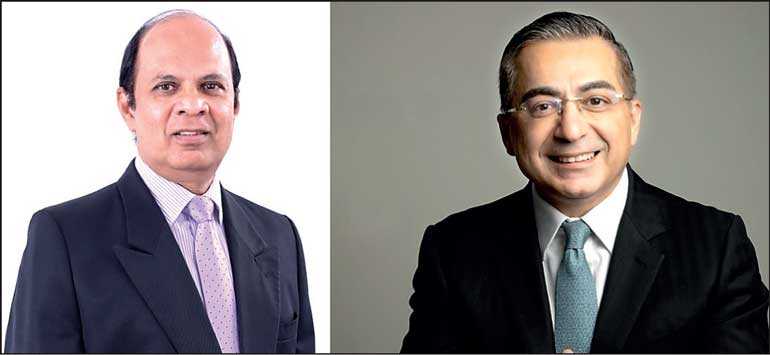Thursday Feb 19, 2026
Thursday Feb 19, 2026
Wednesday, 12 May 2021 00:00 - - {{hitsCtrl.values.hits}}

From left: Ernst & Young Sri Lanka and Maldives Senior Partner and Head of Consulting Arjuna Herath (left) and Dell Technologies President Asia Pacific and Japan and Global Digital Cities Amit Midha
Ernst & Young (EY) facilitated a timely discussion on digital cities as the knowledge partner at the ‘Sri Lanka Internet Day 2021’, the inaugural virtual event organised by the digital chapter of the Federation of Information Technology in Sri Lanka (FITIS) which was held in line with FITIS mandates on digital economy and regional hub and the 7-pillar digital strategy.
Themed ‘Digital inclusion’, the forum emphasised the need for citizen engagement in a digital society and its impact on digital inclusion, and also discussed about Sri Lanka’s digital strategy, digitalisation initiatives and the need to further enhance digital infrastructure to facilitate a digitally empowered ecosystem.
A major highlight of the forum was the discussion on digital cities held with the participation of Ernst & Young Sri Lanka and Maldives Senior Partner and Head of Consulting Arjuna Herath and Dell Technologies President Asia Pacific and Japan and Global Digital Cities Amit Midha. The discussion between Herath and Midha provided deep insights on digital cities and laid the foundation for Sri Lankans to look forward to the concept, inspired by the digital models implemented by Singapore and other developed countries.
Herath laying the context for the discussion indicated that cities have been centres for innovation and economic growth since the perennial times and as a result of that, more and more people migrated to cities in search of jobs and luxury lifestyles. He stated that technology has played a key role in the transformation of cities and that has led to the emergence of the digital city concept.
Midha exploring the topic said: “It is a city that thrives in the fourth industrial revolution”. Midha emphasised the fact that data and data-related industries are going to be crucial within the next 30 to 40 years and that everyone needs to transform themselves to be successful in the digital sphere. He highlighted that digital jobs can thrive with new concepts such as ‘work from home’ and that Sri Lanka has the capacity to build on that. He also stressed on the importance of a digital city in helping individuals and societies to transform themselves with access to economic growth, better living standards, better healthcare and education, mobility and new job opportunities, etc.
The discussion emphasised how new technology can be used to facilitate the everyday lives of people. The Government’s role in this regard was perceived as vital because if necessary policies are implemented and infrastructure is provided, there is enough talent to build on those advantages and come up with new innovations. Midha emphasised that the private sector must join hands in the development efforts, alluding to the fact that ideas from different segments are vital in making progress.
A digital city is expected to have streamlined services relating to transport, health, education, and all the primary services that people look forward to. The discussion went on to show a clear pathway where Sri Lanka can adapt the digital city concept in the long run. According to the thoughts shared, safety is the top most priority for a city because if the city is not safe, people will leave that city. The next pillar is to streamline transportation within the city, from the city and into the city. The third pillar is the development of healthcare and education which are considered as two of the primary needs of people living in a city.
The next important aspect is the Government to work as an app, conveniently assisting to fulfil the needs of people. The focus on sustainability, green energy, smart grid and solar was also highlighted as essential aspects in shifting to the concept.
The discussion also highlighted the need to focus on security when dealing with data and data-related projects at a time when hacking, cyber-attacks and data thefts are abundant in the world. “In the process of digitising cities, intrinsic security is a must have and we need to pay more attention to that going forwards,” says Midha.
Herath spoke about the opening Sri Lanka has in creating a digital city with the new Port City in the making and the need to embed the concepts that were discussed when creating the city, including the required leadership and policies, operating models and processes, and the community and ecosystem, which also need to be considered.
Midha elaborating on this said: “There has to be a vision that has to be built. A dream has to be put out there to get citizens to buy-in. In fact, this is how cities take shape. There is plenty of money in the system. People will help make these cities happen. They need to be told what the dream is, how they can happen, then they buy into this, in fact any public project that makes liveability better makes prices of all real estate in the city to go up. So, all the folks know that by doing things right, it is a significant economic return. They also want future generations to have better access to infrastructure and live in a better place.”
Providing a comprehensive outlook on digital cities, what advantages these cities have in store for the public and what needs to be done in order to shift towards the new concept, the discussion ended after sharing a wealth of knowledge while also acting as an eye-opener for the authorities to look forward to maximising the available technologies, and embrace the digital city concept.